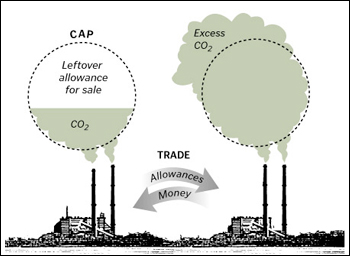In the 21st century we face some tough decisions. Our energy use and the sources from which we get energy has contributed to changes in the composition of our atmosphere. Climatologists and environmentalists have gone about measuring those changes and reporting to the world the risks attendant with our continued seeking of more energy to feed “the beast” that is us.
In the last week I read several stories that motivated me to write what follows. The first of these articles, “The Carbon Monster and the Fiscal Cliff,” appeared in Corporate Knights, a business magazine focused on sustainability. The second entitled “Refiners fret over climate rules,” appeared in the February 28, 2013, The Globe and Mail. And the third, “BP on trial for gross negligence in oil spill,” appears in the ZME Science blog posting of February 27.
The “Carbon Monster”
What is the carbon monster to which the article refers? It is the introduction of a carbon tax in the United States, something that the Republican majority in the House of Representatives opposes. What’s interesting is how the Republicans and some Democrats choose to ignore the advice given to them by their own Congressional Research Service who provided a report in the fall of 2012 called “Carbon Tax – Deficit Reduction and Other Considerations.” The report at the time stated that a carbon tax of $20 per ton of CO2 with a planned annual 5.6% incremental increase could cut the federal deficit in half within 10 years. But for Congress the carbon tax option remains off the table even though it could serve two purposes – reduce the deficit while motivating businesses to cut carbon emissions.
Some Big Oil companies, such as Exxon, are willing to pay a carbon tax. After all they have gotten used to the idea from their offshore operations where carbon cap and trade has already been implemented. But for the biggest contributors of CO2 in the United States, Big Coal, the response to a carbon tax is the spreading of FUD. The American Coalition for Clean Coal Electricity in its own calculations estimates an additional $220 billion burden to coal-fired energy providers. This extra cost would lead to the forced closure of power plants throughout the country with the loss of 900,000 jobs and 69,000 Megawatts of capacity.
Yet in Australia, a country producing lots of coal which it uses domestically to generate power, the government has introduced a fixed carbon tax of $15 a ton. After three years the Australian government will increase the per ton cost of CO2. To offset the carbon tax, Australia has implemented a change in personal income tax, raising the amount of income a person earns before tax can be applied. The end result, a redistribution of where the government obtains its revenue sources and a carrot and stick to motivate energy producers and factories to reduce CO2 emissions. If it can work in Australia, it certainly can work in the United States.
Refiners Fret
This headline and story focus on Canada’s oil industry and initiatives by the federal government to implement greenhouse gas reduction targets for polluters. It’s a belated effort by a government trying to play catchup with the rest of the world, but nonetheless will include oil refineries within the regulation. And of course the industry, represented by the Canadian Fuels Association, talks about the federal and provincial governments placing an “onerous environmental burden” on them. And just like Big Coal in the U.S. in its response to the idea of a carbon tax, responds with FUD threatening that regulation will lead to closing of refineries and attendant massive job losses.
Canada and provincial energy producers like Alberta and Saskatchewan are courting the U.S. to get the Keystone XL pipeline approved to free the bottleneck blocking an increase in the volume of synthetic crude coming from the oil sands to U.S. refiners. The governments in their desire to win a positive response must appear to be doing something “green” about carbon emissions. So draft regulations for the oil and gas sector including refineries are soon to be released. Whatever Canada does will be lockstep with regulations brought forth by the Environmental Protection Agency (EPA) of the U.S.
One might think that regulating CO2 might be considered beneficial to the Canadian and global environment. But no one in the current Canadian government is seriously focused on the environment and climate change. It’s all about moving oil to customers in the U.S.
BP Gross Negligence
This story covers what should be a significant trial about the Deepwater Horizon disaster in the Gulf of Mexico in 2010. The count in human lives lost, wildlife and coastal wetlands destroyed or damaged, beaches fouled, and the ruination of the local fishery doesn’t even begin to state the full picture (see the modeling of the projected extent of the spill over time in the map image below). BP has paid fines to the U.S. government, compensated the families of those who died, and created a multi-billion dollar fund for claims by those who have seen their businesses affected. But the company doesn’t buy in to the “gross negligence” charge. BP’s argument is simple. It was a tragic accident caused by a sequence of events because of equipment and material failures and involved more than BP participants. BP’s counsel states “we firmly believe we were not grossly negligent.”
Environmentalists are concerned that BP will settle out of court for $16 billion They want BP to be held to the standard of the Clean Water Act. If found grossly negligent the 4.1 million barrels spilled, at $4,300 per barrel, would yield a $17.6 billion fine. BP is gambling on a lesser decision, just “negligence,” which under the same act would only cost them $1,100 per barrel, or a little over $4 billion.
In either case or if BP settles the money collected will not be nearly enough to restore the damage to the environment of the Gulf. And considering BP’s annual profits of $25 billion, will hardly be a deterrent for future “negligence” whether deemed “gross” or not.
Crossing the Divide
Our romance with fossil fuels to produce the energy that drives our high technology world has had and will continue to have unforeseen consequences. We face a period of uncertain climate evidenced by melting polar ice, rising sea levels, more frequent damaging weather events, and CO2 levels that continue to climb. We have the means to alter our behavior through voluntary acts or legislation.
What cannot continue is the FUD from both industry and the environmental movement (although more FUD comes from the former and just the “FEAR” part from the latter). And governments need to act responsibly to ensure that what science is reporting gets turned into actions that improve the quality of the environment for all humans and the rest of the species on this planet. There is no divide, no line visible from space, to separate the combatants in this “to and fro” between industry and environmentalists.
Finally I quote Jared Diamond, the author of Collapse, who speaks of the lessons we can learn from Easter Island.



![oil_slick_map[1]](https://www.21stcentech.com/wp-content/uploads/2013/02/oil_slick_map1.jpg)








